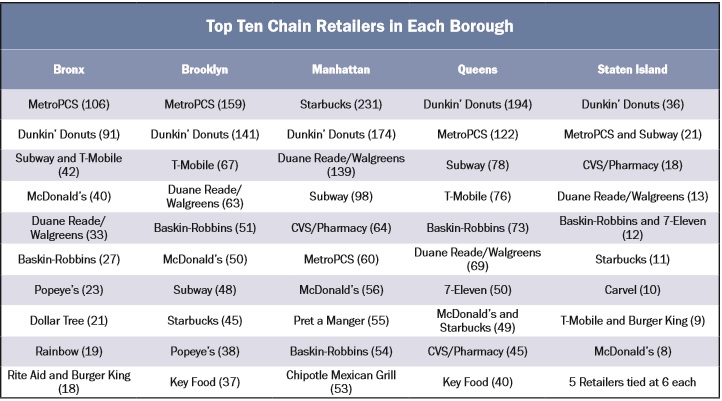
Starbucks at 107-12 71st Ave (Photo: Starbucks FourSquare)
Dec. 26, 2019 By Kristen Torres
The number of chains stores in operation continues to fall across New York City and the decline in 2019 was greatest in Queens, according to a new report.
The Center for an Urban Future released its 2019 State of the Chains report this month and noted that the number of chain stores fell 3.7 percent across the city over the past year—from 8,136 stores to 7,852.
The borough of Queens experienced the largest decline, with the number of chain stores down 4.9 percent.
There were declines in all five boroughs—with Brooklyn down 4 percent, the Bronx 3.8 percent, Manhattan 3.1 percent and Staten Island 2.4 percent.
Clothing, cosmetics and other merchandise retailers were the hardest hit with closures this year. Stores such as Avenue lost six stores; Dress Barn four stores; and Children’s Place three stores.
Payless Shoes closed all 71 of its locations after filing for bankruptcy in February. Beauty supply chain Ricky’s shuttered 12 of its locations, with only two storefronts left in the city. The Mattress Firm closed 20 stores, GNC shut down eight, and GameStop seven locations.
The organization’s report also revealed a decline among some fast food restaurants. Subway closed 43 of its locations, Little Caesar’s closed 11 and Pizza Hut closed four.
But despite broad declines across the fast food industry, some national food chains have continued to expand in the city.
Dunkin’ Donuts remains the city’s largest national retailer, with 636 locations—up 12 from last year. Starbucks also expanded its footprint with 24 new locations to
Other popular fast food chains also opened up more locations since 2018, with Taco Bell opening eight new storefronts and Chick-fil-a and Popeyes opening six each.
The report noted that there were 316 companies that operated chain stores in New York in 2019—65 percent of them had stores in Queens.
Five companies only had storefronts in Queens, including H-Mart, Curves and True Religion, according to the report.
The zip code 11373, which is home to the Queens Center Mall, is the zip code with the greatest number of chain store locations in the borough.
Meanwhile, the zip code 11371—home to LaGuardia Airport– experienced the biggest decline in the number of chain stores in Queens. It lost eight storefronts.

State of the Chains Report 2019
